Car Battery Voltage Fluctuation While Running -Solution 2024
Experiencing voltage fluctuations in my car battery while driving was frustrating. The constant ups and downs irritated me and created various issues that made the driving experience uncomfortable.
Is it normal for car battery voltage to fluctuate? (Short Answer)
It’s normal because when the engine is going slowly, and there are a lot of electrical loads, the voltage will drop a little, but if you speed up the engine, the voltage should go up.
This article explains the origins and symptoms of fluctuating voltage in cars and some measures you may take to prevent this problem.
Table of Contents
Can a bad battery cause voltage fluctuations?
Yes, I’ve personally dealt with a situation where a bad battery caused voltage fluctuations in my car. The erratic voltage levels signaled potential issues with the charging system.
Seeking professional help to diagnose and address these problems became crucial for ensuring my vehicle’s reliable and stable power supply. Below are some detailed causes of voltage fluctuations.
Also Read: Car Battery Voltage Low When Running
Causes of Car Battery Voltage Fluctuation While Running:
Battery voltage keeps going up and down? When the battery’s charge is low, the voltage is slightly jumped to return the charge quickly.
When the charge level is high, the voltage is reduced somewhat to stop the battery from getting too charged. The voltage may go up or down if the car has a tester. This is fine.
Why is my car battery voltage fluctuating? Car battery voltage fluctuations while it is running can cause several problems, including:
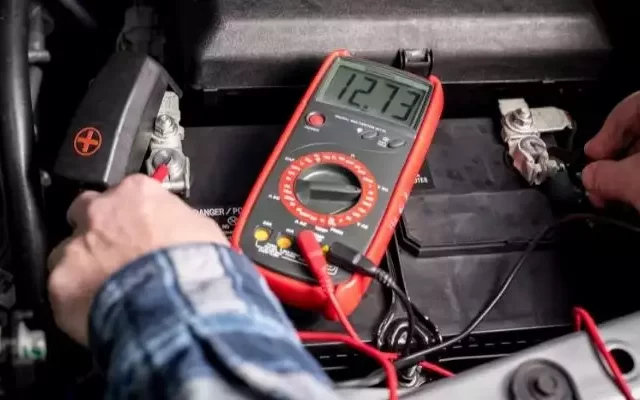
1. Loose Battery Connections:
The most common cause of car battery fluctuation is loose battery connections. It transmits power from the battery to the car’s electrical parts. Loose connections cause poor contact between the battery and the car’s electrical system.
Also Read: Car Tries To Start When I Connect The Battery
2. Battery Terminal Corrosion:
Battery terminal rust causes voltage fluctuations by affecting electrical current flow. Rust can also cause the battery terminals to become loose, leading to more issues.
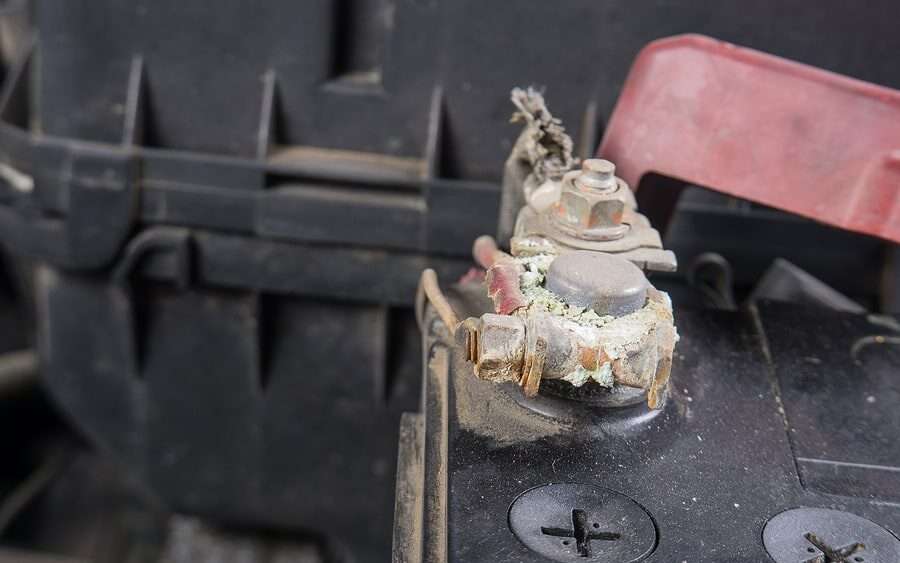
3. Alternator Problems:
Why is my battery voltage going up and down? The alternator is responsible for charging the battery while the engine is running.
Alternator fluctuating voltage? A faulty alternator can cause voltage fluctuations by not properly charging the battery. To prevent this problem, make sure your alternator is functioning properly.
Battery gauge between 9 and 14? When running, 14 is an average number. The 9 means that the alternator is not putting out any power.
4. Loose Alternator Belt:
A loose alternator belt can cause voltage changes while running. It reduces alternator output and results in poor battery power.

This leads to improper voltage levels in the battery. Regularly checking and tightening the alternator belt is important to avoid this issue.
5. High Electrical Load:
Why does my battery voltage fluctuate? A heavy electrical load can lead to voltage fluctuations while running because the battery can’t meet the car’s electrical parts demand. It results in a voltage drop, affecting performance and causing damage to other electrical parts.
Also Read: Why Is My Car Battery Showing 15 Volts
Battery voltage fluctuation at idle?
That is common. When everything is off, and the engine is idle, the alternator voltage should be higher than the battery voltage.
Some charging systems don’t charge when the engine is idle because they feature an overrunning clutch integrated into the alternator pulley.
Signs Of Voltage Fluctuations:
The following are common signs of voltage fluctuations in a car:
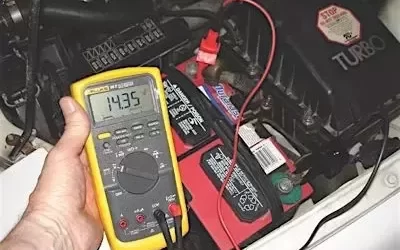
1. Engine Slowdown:
One of the most common signs of voltage changes is engine slowdown. The engine may stall or not start due to a loss in voltage.
Also Read: How Long Does It Take To Change A Car Battery
2. Dimming Lights:
Another sign of voltage alteration is dimming lights, such as a drop in voltage. It can decrease output from the car’s electrical parts, including the headlights, rear, and inner lights.

3. Poor Performance:
Voltage fluctuation can also result in poor performance, as the car’s electrical parts may not receive enough power to operate correctly. It may lead to a reduction in speed, fuel efficiency, and other performance problems.
4. Electrical Component Failure:
Voltage alters can also result in electrical part failure. Because the increased stress on the electrical parts can cause them to wear out quickly and fail.

How to Fix Voltage Fluctuation:
How to solve the voltage fluctuation problem? The answer is described below:

1. Battery Maintenance:
Regular battery maintenance prevents voltage fluctuation while running by keeping connections secure, terminals clean, and alternators functioning properly. This ensures proper voltage levels and reliable performance.
Also Read: How Long Does It Take To Charge A Car Battery At 6 Amps
2. Alternator Checks:
Regular alternator checks can also prevent alternator voltage fluctuates. Making sure the alternator is operating properly and that the belt is secure.
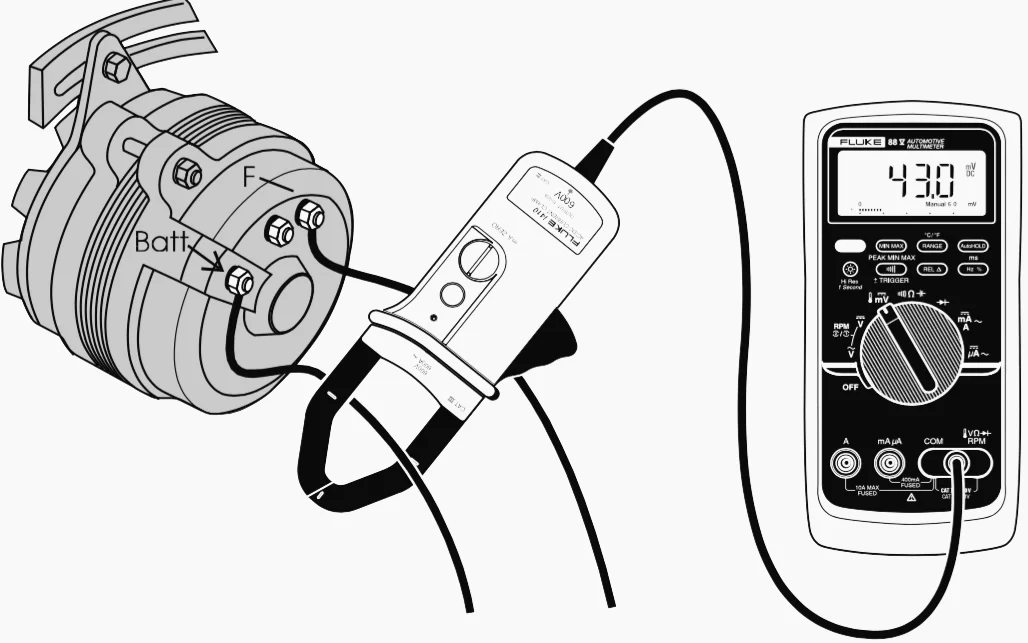
3. Reducing Electrical Load:
Reducing the electrical load on the battery can also prevent voltage fluctuation. Because it can reduce the battery’s demands and prevent a voltage drop. It can be achieved by turning off unnecessary electrical parts when they are not in use
4. Installing A Voltage Stabilizer:
Voltage Stabilizer minimizes voltage fluctuations and ensures your car receives stable power. This helps safeguard the electrical system in your car and protect against damage to sensitive electronics.
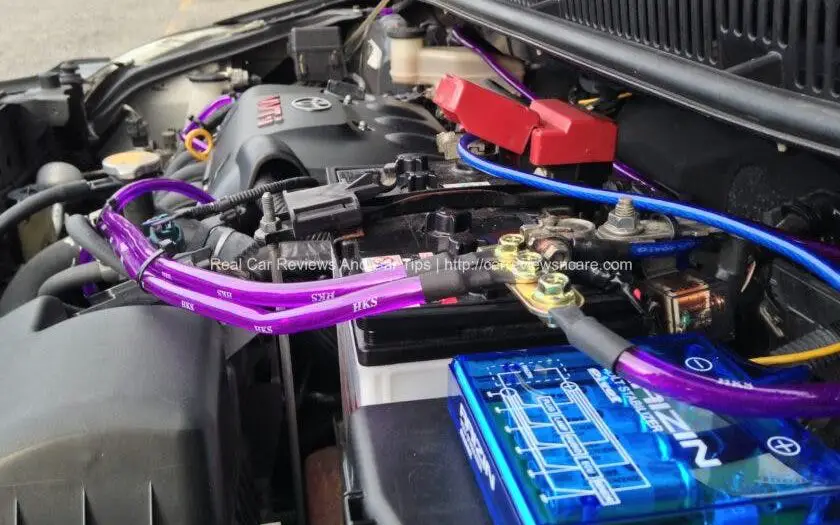
Also Read: Car Only Starts When Jumped Battery Good
Should My Battery Voltage Fluctuate?
No, the power of your battery shouldn’t change. If it does, your car probably has something wrong with it. Changes in battery energy mean your car’s battery isn’t charged correctly.
This can cause problems, like your car not starting or the battery dying quickly. If your car’s battery power gauge is going up and down, you should take it to a mechanic so they can figure out what’s wrong.
battery voltage jumping around:
In my own experience, I’ve observed that when the battery’s state of charge is low, the voltage is intentionally increased slightly to expedite recharging. Conversely, when the state of charge is high, the voltage is lowered somewhat to prevent overcharging. This dynamic adjustment, reflected on the voltmeter gauge in the vehicle, is a normal operational behavior that I’ve come to understand and accept as part of regular battery management.
What Should My Battery Gauge Read While Driving?
Does battery voltage fluctuate while driving? Yes, your battery gauge should show between 13 and 14 volts while moving or driving. If it says less than this, the battery is not being charged properly. If it shows a number higher than this, the cells are swollen.
No matter what is wrong with your car, you should take it to a mechanic so they can figure it out.
Also Read: Can A Bad Battery Make Your Car Overheat
Why Is My Battery Voltage Low?
If your battery power isn’t as high as it used to be, it could be because of some things. The low power could be because the battery cells are empty. If this is the case, the battery will need to be charged. Another option is that the wires that connect the battery to the gauge are not tight. Check the links and tighten them if they need to be.
Why Is My Battery Voltage High?
When your battery’s energy is high, the cells are fully charged. This isn’t always bad, but it can be if the cells are swollen. When this happens, it can hurt the battery. If your car’s battery charge is always high, you should immediately take it to a mechanic.
Why Does My Battery Gauge Go Down When I Stop?
Why does my voltage gauge fluctuate? This is fine! The alternator in your car stops charging the battery when you stop moving. This is why the power of your battery drops when you stop. But once you start going again, it should return to 13 or 14 volts.
If it doesn’t, your generator or voltage regulator may be broken. These are just a few things that can cause the voltage of a battery to change. If your battery gauge isn’t working right, make sure to check all of these first.
Also Read: Car Stalling After Battery Change
Why Does My Voltage Drop At Idle?
Battery voltage fluctuating when car is off? If your voltage drops when the engine is not doing anything, your alternator is not charging the battery well. This could be caused by a bad link or a problem with the alternator itself, among other things. At rest, the voltage should be between 13 and 14 volts. If it’s less than this, there might be something wrong.
Should Alternator Voltage Fluctuation?
Any link should have a zero or less than 0.1 volts voltage drop. Check for voltage drops at the positive and negative battery cable connections, the BAT+ power link on the alternator, and the engine ground strap(s).
Alternator fluctuating voltage? The charging system’s output voltage frequently fluctuates visibly due to leaking or shorted diodes.
Additionally, faulty diodes might permit current to escape from the battery back through the alternator to ground, resulting in the battery discharging overnight.
Related Questions:
1. Can Battery Voltage Fluctuations While Running Damage My Car’s Electrical Components?
Yes, battery voltage fluctuation can cause damage to the vehicle’s electrical components. This is because the fluctuating voltage can cause stress on the parts, leading to early failure or other problems.
2. What Should I Do If My Car Is Experiencing Battery Voltage Fluctuations While Running?
Professionals must check the vehicle’s charging system if your car is experiencing battery voltage changes. It can assist in determining the reason for the fluctuation and stop further harm from occurring to the car’s electrical components.
3. Is It Normal For Battery Voltage To Fluctuate?
Is it normal for alternator voltage to fluctuate? No, a stable voltage level is essential for a car’s electrical system to function properly, and voltage changes can indicate a problem. A consistent voltage level should be maintained while the engine is running.
4. How To Check Voltage Fluctuation?
A multimeter is a device that can measure electrical properties, including voltage. Attach the multimeter to the battery’s terminals and check the reading to determine the voltage on your car batteries when the engine is running.
5. How Do You Know If the Alternator Is Bad?
It can be challenging to distinguish between your car’s bad alternator and battery. You most certainly have an alternator issue if you jumpstart your car and it dies immediately. Some indications of an alternator failure are as follows:
- Trouble starting your car.
- Frequent stalling.
- Whining or screeching noise after the vehicle starts.
- Dim or overly bright lights.
- The smell of burning rubber or wires.
- Dead battery.
- The battery dashboard warning light is on.
6. Why Does The Alternator voltage fluctuates at idle?
Experiencing high electrical loads during idle, such as air conditioning, headlights, and other accessories, has been a factor causing voltage fluctuations in my car.
Furthermore, I’ve learned that voltage fluctuations can also result from poor connections or wiring issues, emphasizing the need for regular inspections and maintenance to ensure a stable electrical system.
7. battery voltage meter going up and down?
If the battery’s state of charge is low, a slight voltage increase facilitates faster recharging. Conversely, when the state of charge is high, a slight voltage decrease prevents overcharging. These adjustments, reflected on the vehicle’s voltmeter gauge, are considered normal operational behavior.
8. Is the car battery charger fluctuating?
Experiencing fluctuations in my car battery charger was a concern I encountered. The varying charging levels prompted me to investigate potential causes, such as loose connections, damaged cables, or issues with the charging unit itself.
9. Why does my multimeter fluctuate?
Facing issues with a low or dead battery has been common in my experience. The internal voltage reference tends to be less stable when the battery falls below a certain level, often resulting in fluctuations. I’ve found that the battery is the primary culprit in about 90% of cases.
10. Can voltage fluctuations affect the overall performance of a vehicle?
Yes, persistent voltage fluctuations may lead to unreliable power supply, affecting the performance of various vehicle components. This can result in issues such as engine misfires, erratic lighting, or malfunctioning electronics.
Conclusion:
Voltage fluctuation in car batteries can seriously affect the car’s performance and reliability. These fluctuations can cause problems for the car’s electrical system, leading to reduced performance and even damage to parts over time. To prevent voltage fluctuation, it is important to maintain and check the battery, alternator, and other electrical parts regularly. Some common solutions to voltage alters include reducing the electrical load on the car, installing a voltage stabilizer, and repairing damaged parts.
Also Read:
- Disconnected Car Battery Losing Voltage
- Red Liquid On Car Battery
- Car Battery Died With Interlock
- Car Battery Reading 18 Volts
References:
- https://www.quora.com/What-could-be-the-cause-of-a-car-battery-voltage-fluctuating-b-n-12v-and-14-2v-when-driving-Car-starts-fine-each-time-though
- https://www.bimmerforums.com/forum/showthread.php?2059175-Can-bad-battery-voltage-fluctuations
- http://www.v8buick.com/index.php?threads/wildly-fluctuating-battery-voltage.329272/
- https://www.stingrayforums.com/threads/battery-voltage-fluctuates-between-14-2v-and-12-8v-while-driving.73233/



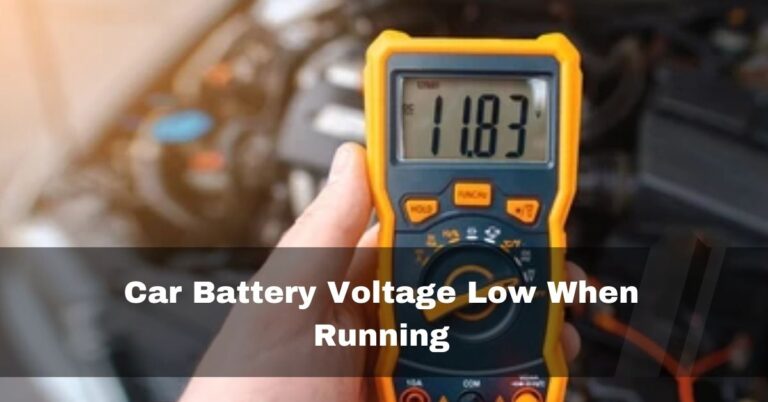

![Battery Only Reading 10v – [2024] Why? Should I Recharge It](https://vehicleslounge.com/wp-content/uploads/2023/07/Battery-Only-Reading-10v-768x402.jpg)

